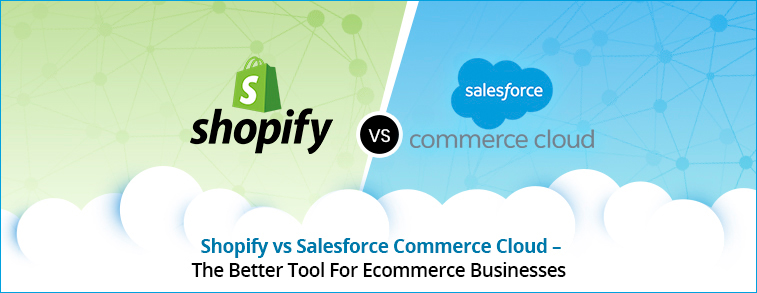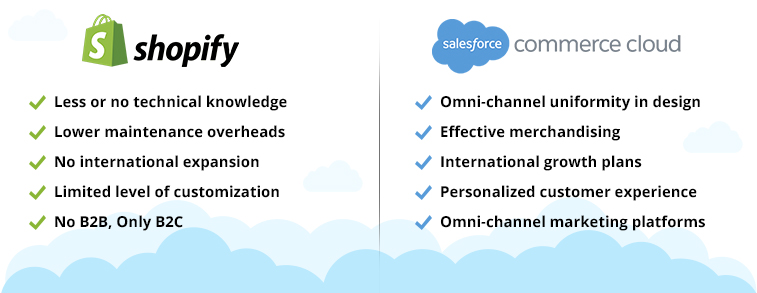Shopify vs Salesforce Commerce Cloud –The Better Tool For Ecommerce Businesses

If you own an ecommerce business in today’s time, it becomes imperative to have a “right-fit” platform/tool that helps you stand out from your competition and attract new customers. An appropriate ecommerce platform will not only help sell your goods/services but will also help you reduce overall costs and improve agility of your business processes.
Picking the right ecommerce solution requires a clear understanding of your functional requirements and the channels that you intend to use to market and sell your products/services. To thrive in the long run, this analysis needs to be done keeping in mind future risks, product roadmap, and growth plans.
Salesforce Commerce Cloud (formerly known as Demandware) and Shopify are both great options to meet specific business needs. Let’s take a closer look at the features and benefits each of these options provide:
Key Features - Shopify
Shopify has experienced massive adoption in recent years, one of its major strengths being a long list of built-in features for ecommerce businesses. Some of the main highlights are:
- Low code platform
- Reduced cost of ownership
- Digital pay support
- Diverse integrations
Shopify also provides advanced features such as loyalty programs, customer review management which can further assist your team in formulating efficient business strategies. It also helps you improve your online presence through effective digital marketing campaigns and several customization tools.
Key Features - Salesforce Commerce Cloud
Still known as Demandware to many, Salesforce Commerce Cloud has served as an ideal platform for ecommerce businesses that are looking for in-store Point-Of-Sale functionality and stock allocation. Below are some of the key selling points of SFCC:
- POS integrations
- In-store online promotions
- Omni-channel abilities
- Fully managed PaaS
In addition to this, SFCC also provides effective order management, ensuring that your team keeps track of both online as well as in-store orders. SFCC also supports heavy customization, thus enabling you and your team to provide customized shopping experiences to your customers that further improves brand value.
Shopify vs Salesforce Commerce Cloud
Based on the data collected in June 2021, Shopify tops the chart by owning a 26% market share in the ecommerce platform category whereas SFCC has 12% market share in the same space.
It is worth noticing that Salesforce Commerce Cloud provides better flexibility and customization than Shopify. SFCC provides modules and TPA integrations in a much smaller ecosystem. As a result of this and restrictions around certain integrations, the cost is likely to skyrocket in the case of Salesforce Commerce Cloud
Shopify on the other hand, falls behind Salesforce Commerce Cloud when it comes to handling complex business processes. To cover its weaknesses, Shopify comes at a reasonable pricing package, making it the best option for businesses looking for a platform that is meant to provide simple but essential functionalities.
Determining The Best Fit – Shopify or SFCC?
Given the strengths and weaknesses of both the platforms, the selection of either Shopify or SFCC really depends on the nature of the business and its future. Setting aside the overall pros and cons, both tools offer a compelling product market and are suitable to effectively manage sales and ecommerce operations.

Wrapping Up
To conclude this comparison, if your business is in the growth phase and falls within the small and medium enterprise category, then Shopify will be the more suitable choice. On the contrary, if your business operates on a global scale involving multinational presence or if you fall into the large enterprise category, then Salesforce Commerce Cloud will prove itself as the better option.
Aress Ltd. is a certified development partner for both Shopify and Salesforce.com. We have worked with scores of clients across the ecommerce domain and have catered to their specific business objectives while leveraging the power of both the above platforms. Feel free to register yourselves for a consultation at info@aress.com or reach out to me on karan.ahluwalia@aress.com for a quick chat.
